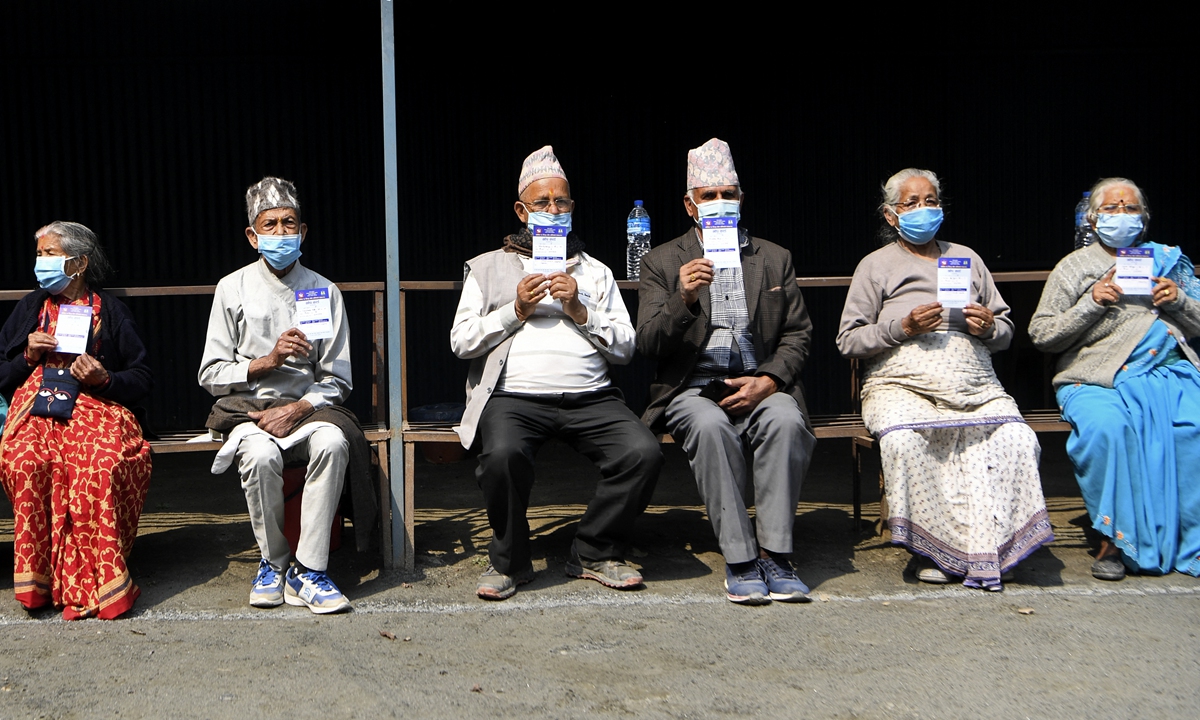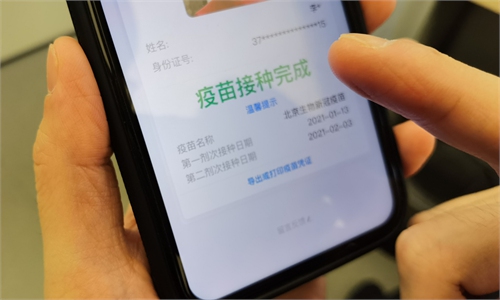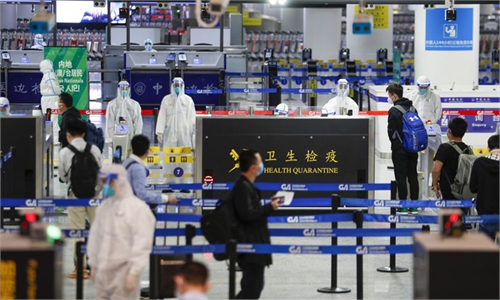
People display their cards after getting the coronavirus vaccine on the outskirts of Kathmandu, Nepal. Nepal will administer the second dose of the COVID-19 vaccine from April 20 to April 28 to those who have received the first shot of the vaccine from January 27 to February 12. The first dose of the COVID-19 vaccine was given to health professionals, security personnel, officials of diplomatic missions, embassies, and those working in the United Nations. Photo: AFP
The World Health Organization (WHO) on Monday once again expressed practical and ethical concerns over using a vaccination passport as a certificate for international travel, while China on the same day launched its version of a health code for people who travel abroad.
Chinese experts noted on Tuesday that China can help by sharing its experience with and provide technical support to the WHO to organize the issue, as China is the most experienced country in using a health code system in the world while the WHO is the most proper organizer for the matter to ensure independence, fairness and data security.
Technology would not be a problem, Chinese experts said, noting that if the international community unites to promote the work, a platform can be established within 2-3 months and, optimistically, can be used for the Tokyo Olympic Games scheduled between July 23 and August 8.
"In terms of technology, I believe that Chinese companies can build an international platform in just one week, but it is better that the WHO, rather than any country or regional organization, be the organizer to ensure the independence, fairness and data security of the platform," Xiang Ligang, director-general of the Beijing-based Information Consumption Alliance, told the Global Times on Tuesday.
The WHO can draft the rules, procedures and data format. China is very willing to provide support in sharing experience and techniques in setting up such a platform as the country has rich experience in this and has realized data sharing between the health code platforms of different Chinese provinces and regions, Xiang noted.
Cooperation between WHO and China would be a powerful combination to promote the matter fast with a mature technology while guaranteeing public trust, Chinese experts noted.
The certificate includes nucleic acid test and serum antibody results, vaccine inoculation and other information. It has an encrypted code that allows authorities to verify the holder's personal information, according to China's Ministry of Foreign Affairs.
China is willing to discuss with other countries over mutual recognition of COVID-19 vaccinations, which is helpful to resume and secure safe and orderly people exchanges, State Councilor and Foreign Minister Wang Yi said on Sunday.
Various concerns
Michael Ryan, executive director of the WHO Health Emergencies Program, said at a press briefing on Monday that there are "real practical and ethical considerations" for countries considering using vaccine certification as a condition for travel vaccines not widely available.
Ryan said on March 1 that the WHO would be working with its member states and providing them with advice on the issue, and more advice from the WHO concerning the issue would be seen in the coming days and weeks.
WHO now has a working group, an internal task force working with external partners on the public health and the policy considerations for WHO member states when it comes to adapting public health measures in light of vaccine introduction, as well as a group working with the project on the electronic certification (or e-certification) of vaccination, according to Ryan.
A person close to the matter who preferred not to be identified told the Global Times on Tuesday that Chinese public health authorities have been studying the issue, including discussions about whether arrivals from overseas to China who have been vaccinated should be exempted from 14 days of quarantine.
"The mutual recognition of the health code may not be a complicated technical question, but whether different countries would accept the mutual recognition remains a major issue considering that the anti-epidemic prevention measures are different with no unified evaluation and standards," he said.
Also, the WHO being against for vaccination certificate used as international travel document is also reasonable, as the effectiveness of the vaccine in preventing a person from getting infected remains unknown, and there are problems in a fair vaccine supply at the global level, he said.
"As far as I know, China has yet to talk about any detailed cooperation with the WHO when it comes to an international health certificate including vaccination and testing information, but we've been studying it," he noted.
If Chinese vaccines pass WHO pre-certification, it will greatly encourage international recognition of Chinese vaccines and probably help to promote the establishment of an international mutual recognition platform, Feng Duojia, president of the China Vaccine Industry Association, told the Global Times on Tuesday.
Chinese COVID-19 vaccine developers - Sinovac Biotech, Sinopharm and CanSinoBio - have submitted applications to join the WHO's COVAX plan.
WHO experts visited the workshops of Sinovac Biotech and Sinopharm in Beijing in February.
Feng estimated that the results would come out in 2-3 months.
Sinovac Biotech CEO Yin Weidong told the Global Times on March 3 that during the on-site inspection of the Sinovac factory, the WHO gave the company very pertinent and significant suggestions on improving medical quality.
We will quickly receive the official evaluation document from the WHO team, and improve as requested. The WHO's approval is crucial for us as it will enable us to provide vaccines to more countries, Yin said.
Potential partners
While it may take a long time to set up an international platform, Chinese experts said it is very possible and practical for China to start mutual recognition with countries that had approved Chinese vaccines, such as Malaysia and Indonesia; or some neighboring countries that have practical needs for resuming exchanges, such as South Korea and Japan; or regional organizations such as the Association of Southeast Asian Nations; or any other country that is willing to cooperate.
Israel wants to be the first country to sign an agreement on mutual recognition of vaccines with China, Israeli Ambassador Irit Ben-Abba Vitale said in an interview with Chinese media on Monday.
Reaching an agreement on mutual recognition of vaccines with China is one of the main things that I would like to push through with the Chinese government to see if we can get an agreement on the mutual recognition of vaccines. This would be a major task ahead for the embassy, the new ambassador said.
The ambassador said it was easy for Israel to reach mutual recognition agreements with Greece and Cyprus as they had all adopted the Pfizer/BioNTech vaccine. To achieve mutual recognition with China, Israel can share data on different vaccines and their efficacy with China.
South Korea and Japan also need such a platform to resume exchanges, especially considering that the Tokyo Olympic Games will start on July 23, Xiang noted.
The three countries have the technology and practical needs to resume exchanges. As long as they agree to cooperate, I believe a platform can be ready before the July Tokyo Games, said Xiang of Information Consumption Alliance.
China on May 1, 2020 opened a "green channel" for workers who travel between China and South Korea to work in many sectors like business, logistics, production and technology, to help them resume work in China as soon as possible. Experts said this experience would benefit the two sides' cooperation in vaccination mutual recognition.
Experts also noted that it would even be easier for countries like Malaysia and Indonesia that had approved Chinese COVID-19 vaccines to realize vaccination mutual recognition with China as ASEAN members had weighed a digital coronavirus vaccine certificate to revive the region's ailing tourism sector during the two-day ASEAN Economic Ministers meeting that ended March 3.
Some experts and politicians in China and the US have also called on the two sides to enhance cooperation in public health and promote mutual recognition of vaccination.




